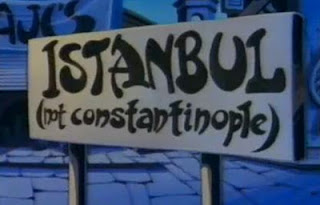All of us who love both movies and books have made the comment at one time or another: "The book was better than the film." This usually happens when we hear that a book we really like is getting the Hollywood Treatment. Simultaneously, we are excited and terrified. Will the film be as good as the book? Will it contain everything we loved about the book? Of course, these days, when Hollywood (and other film capitals) seem intent on trashing the past, trampling on our beloved franchises, and fusing propaganda and entertainment, we often wonder, "Will the film be anything like the book?" Of course, we don't really need a struggling NWO to trample on books. Hollywood has been doing that for years.
I recall when the film World War Z was released. One review I read after its debut stated, "The film has everything you loved about the book's...title." At that time, I had not read the book, so I did not understand exactly what he meant. When I finally read the book, I understood. The film was forgettable overall, but I remember it had Brad Pitt in it and was shot in every exotic location willing to give the filmmakers a tax break. Alas, no underwater zombies or epic battles, just bland characters, silly situations and a quick fix to the world's end. Prior to penning World War Z: An Oral History of the Zombie War, Max Brooks wrote the satirical, yet extremely practical The Zombie Survival Guide, which I keep on the nightstand next to my bed...you know, just in case.Not long after I read the survival guide, I had occasion to summon the police to help with a car parked across my driveway. That morning, I had had to drive the Wife's car down the sidewalk till I could pull onto the street so she would not be late for jury duty. When the officer arrived, he saw the problem and called a tow truck...as it turned out, the guy who drunkenly parked there had just got his car out of impound because it had been towed after blocking another driveway. While we were waiting for the tow truck, the officer noted I had a new driveway gate up by the house. He commented on how well built it looked, an improvement on the old gate it had replaced. I told him, "Well, yes, it is well built, but it won't hold off anything worse than a Zombie Level 1 siege." Without a pause, he replied, "Hopefully, it won't come to that, and perhaps the Zombie Apocalypse will pass Chula Vista altogether." Ah, ya gotta love the officers of the CVPD.
.jpeg) |
 |
A spaceship (not a flying saucer) lands outside the Capitol in Washington DC, an alien named Klaatu emerges with a giant robot (Gort in the film, Gnut in the story), and Klaatu is shot. In the story, he dies, his body is placed in a mausoleum and the robot stands unmoving. In the film, the wound is not fatal, Klaatu hides in the general population and story goes from there, eventually ending as a warning against the Earth about the use of nuclear weapons. It's a well-made film, but it's really just a message film, tying its impact into a theme that was more important then than it is now. The story, however, is an "idea story," like many of the stories that emerged from Astounding SF in the 30s and 40s. The precipitating events (the landing and Klaatu's death) happen years prior to the start of the story, and we first see Gnut through the eyes of a reporter who, at night, sneaks into the museum built around the motionless 8-foot-tall humanoid robot. There, he sees the robot move, enter the ship and attempt to reconstruct Klaatu from a recording. The recording is flawed, so the new Klaatu dies (again) and the reporter provides a flawless recording so the robot can use it back home to bring Klaatu back to a stable life. Just before the robot heads back to the stars, the reporter asks him to tell his master, the new Klaatu, that the death was a terrible accident. The robot's reply: "You misunderstand. I am the master."
Now, don't get me wrong. The film is well-written, well acted and the photography is superb, but it is the story of a blood-drinking vegetable that ends up getting fried. In the story, the alien is a protean predator, highly intelligent and intent on getting out of the Arctic where it can use its shapeshifting powers and ability to reproduce asexually to displace humanity. The film's strength was in producing a claustrophobic horror, much as we experienced in the film Alien, which was based on an uncredited story by A.E. van Vogt. In the story, the focus is on paranoia. Because of its powers and intelligence, the alien can be anyone, from the sled dog to the fellow sitting next to you. I have always held the opinion, if you are going to base a film on a story, film that story, not something that is nothing like the story. Otherwise, just come up with an original script. Now, this was not the end of "Who Goes There?" and Hollywood, because it served as the basis for John Carpenter's 1982 The Thing. In this version, they get the creature's powers correct (very graphically), but the film...well, most people seemed to like it.
Well, I hope enjoyed looking at some films that wasted their source stories. There are a lot more, and you probably have your own favorites. Now, that's not to say that there are not films that showed respect and fidelity to their source books. I can think of several. Hopefully, we'll get a change to take a look at a few of them.






















































